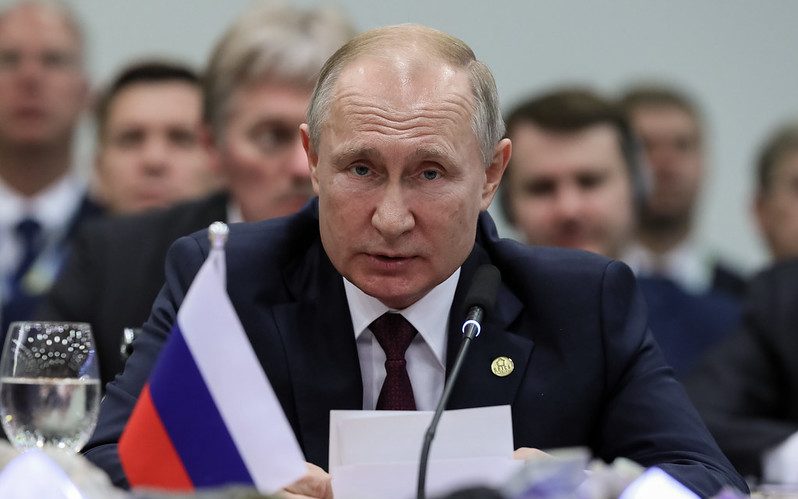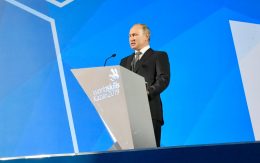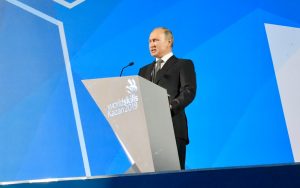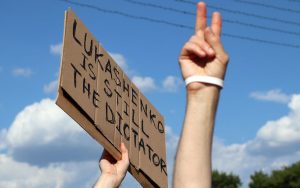Over the last weeks, the world has closely watched what is happening at the Russian-Ukrainian border. Even though the Ukrainian border has been the focus of attention for some years when the status of Crimea and Donetsk were at stake, the current crisis is taking another level. This is due to the deployment of a great number of Russian troops at the border, raising concerns about the region’s future and making experts speculate about an invasion of Ukraine by Moscow1. With more than 100.000 troops and heavy artillery, the results of this type of action could unchain unmanageable consequences, not only to the Eastern European region but to international security as a whole.
Feeling threatened by the increase of NATO members close to the Russian border and perceiving NATO’s growth as an existential security threat, Vladimir Putin aims to re-establish the country to the position of a great power (whose status was damaged after the sudden dissolution of the Soviet Union). As NATO is being mainly commanded by the United States, Putin considers it as a violation of his historical sphere of influence, because Russia exerts high levels of influence in this area since its imperial times. Ukraine, at the same time, represents more than just Russian geopolitical interests on this chessboard: it represents an important historical and cultural heritage to Moscow.
A 1996 article called “Borders of Identity: Ukraine’s Political and Cultural Significance for Russia” 2 argues that “the deep roots of Russia’s ethnocultural identity lie in the ancient Eastern Slavic state of Kyivan (Kievan) Rus”. But that alone might mean nothing to the readers not acquainted with Russian history and especially if they do not know that “not only is Kyivan Rus’ the grandmother state of contemporary Russia, but all sources of cultural authenticity flow from that historical period and from that geographical area. More than half of this area lies within the boundaries of the modern Ukrainian state”. The author even says that “if we equate Kyivan Rus’ with Ukraine, as some historians attempted to do, it is hard, in fact, almost impossible, to distinguish any non-Ukrainian foundation in the Russian national identity”. This is one of the biggest motives, which explains why Russia worries so much about the possibility of the cooptation of Ukraine by the West and its readiness to carry out military action to defend it. As the article goes: “no wonder ontological foundations of Russian national existence are felt to be threatened”.
However, even though specialists and pundits are warning decision-makers about the risk of a major war involving great powers (and they are right doing so), there are four reasons to believe that there will be not an invasion from Russia nor deployment of NATO forces on Ukrainian territory, let alone a major conflict.
First, the American people will not accept any new foreign adventure of the American military. After the trauma and shame caused by the disastrous withdrawal from Afghanistan and a campaign in Iraq that led to nowhere, public opinion would not accept an even more pretentious mission against the powerful Russian military.
When the United States invaded Iraq and Afghanistan, a great part of the establishment and the public opinion thought both campaigns would be quick and objective since both countries were not as powerful as America in military and institutional terms. Nonetheless, history has shown different results. If countries like those have presented themselves hard to tame and control, it will be harder in a direct conflict with a country as huge as Russia and with such a huge military force, a relatively big economy and patriotic people. It is not an exaggeration to say that in a war with these two heavyweights, there will be no winner but many losers.
In addition, American general public opinion does not care enough about a distant eastern European country to agree to fight a war of this kind- Instead, it prefers to face more immediate problems such as inflation and the pandemic’s fallout. Robert Kagan, in his book “The Jungle Grows Back”, says that “today Americans questions why their nation has to be so deeply involved in the rest of the world, why they have to spend lives and money in such apparently hopeless places as the Middle East, why rich allies like Germany, Japan, and South Korea cannot take care of themselves, and why the United States must risk war for matters that seem at a remove from America’s immediate economic and security interests” 3.
Secondly, European powers, especially Germany, will not take the risk to protect Ukraine. The Balkan crisis in the 1990s has shown how weak and paralyzed the European powers were. Lacking proactivity and strategic coordination, countries like France and the United Kingdom (major military powers) could neither form nor lead a coalition to fight and tackle the horrors of the genocide carried out in Bosnia. The solution came with a US-led NATO intervention showing that Washington held the final word concerning military security in Europe in the post-Cold War period. This situation still appears to be relevant even 30 years after the end of the Cold War, after NATO’s existential crisis, and Trump’s abandonment of America’s European allies. One main explanation is that the European Union could not arrange a supranational security institution of its own, still depending on the member states’ individual decisions. The current situation with Ukraine may show that the situation remains the same as in the 1990s. Even though France has tried to launch some initiatives in this regard, the expectations of a coordinated and united force of Europeans forces under the EU flag4 are far from reality.
Robert Kagan explains the fragility of Europe to take care of this type of hardcore security issue, especially when it concerns Russia, by the fact the European Union and Russia are located in different historical logics regarding geopolitics. In his book “The Return of History”, Kagan says that “Russia and the EU are neighbors geographically. But geopolitically they live in different centuries. A twenty-first-century EU, with its noble ambitions to transcend power politics and lead the world into a new international order based on laws and institutions, now confronts a Russia that is very much a traditional, nineteenth-century power practicing the old power politics” 5. In other words, the EU’s strategic logic cannot understand what Moscow is doing and why it’s doing it, it seems anachronical to Brussels.
Moreover, the threat Russia poses to Europe’s energy supply could hinder a European response. Even though it is a historical problem, Europe still sees its hands tied on this matter. Nord Stream 1 is the main pipeline that takes natural gas from Russia to Europe, especially Germany, passing through the Baltic nations and bypassing Ukraine, since an unstable region could be problematic to the flow of gas and make Europe’s energy supply uncertain. This factor forces Berlin to think twice before taking any serious measure to defend Ukraine or to take part in a direct conflict with Moscow, as it could cause an interruption of the energy flow to the European power causing grave economic and social damages and, thus, turning unbearable the costs to defend a non-NATO country like Ukraine. Yet, the new administration of Olaf Scholz has said that “Russia would suffer ‘high costs’ in case of a military intervention (…) Germany’s allies have still been left to wonder what cost it is prepared to beat to confront possible Russian aggression” 6.
Furthermore, German authorities have been vague as well concerning the possibility to impose sanctions on Nord Stream 2 (a new undersea gas pipeline from Russia to Germany) “insisting it was a ‘private-sector project’ and one ‘separate’ from Ukraine”, according to a New York Times Article. All these factors make it highly unlikely that there will be an autonomous EU reaction to any Russian aggression towards Ukraine.
The third factor which contributes to the fact that an invasion of Ukraine by Russia is unlikely is that it will not be profitable to Moscow. Russia already has great control and influence in Ukrainian politics. From Crimea and the support of separatist movements in Eastern Ukraine, which has more connections to Moscow than Kyiv, Putin sees Ukraine as a zone of influence worth to be preserved from Western influence. The appearance of invasion, in my opinion, is just that: appearance. To strengthen my idea, I present two arguments.
First, even if Russia invades Ukraine with no military reaction carried out by the West, the economic sanctions imposed by the United States and European Union would be even deeper and more intense than it already is. “The Biden administration and its allies are assembling a punishing set of financial, technology and military sanctions against Russia”. According to this article from the New York Times, the West would “cut Russia off from the SWIFT system, which executes global financial transactions between more than 1,100 banks in 200 countries”. In addition, the United States is thinking about technology sanctions that “would target some of Mr. Putin’s favored industries – particularly aerospace and arms, which are major producers of revenue for the Russian government”. Moreover, Western sanctions could infringe on other Russian products that “go well beyond merely banning the sale of computer chips.” In one additional step, according to American officials, the Commerce Department could use a ruling that would essentially ban the export of any consumer goods to Russia – (…) – that contain American-made or American-designed electronics. That would apply not only to American but also to European, South Korean and other foreign manufacturers that use American chips or software” 7. All this could damage the Russian defense industry and other areas of the national productive system at such a level that the country would take years to recover or to find other strategic partners to make up for the absence of Western technology and consumer goods. In other words, the strategic calculus of invading Ukraine does not seem profitable to Russia in short and medium terms.
Secondly, Russia does not need to invade Ukraine to have political and military control over it. The Russian economic, political and cultural influence in Ukraine is already tangible and one of the few problems of Moscow’s influence over the neighbouring country is the pressure of the West to make Ukraine a full member of NATO and the European Union. Of course, there are political movements inside Ukraine demanding a closer approach towards the West and trying to take distance from Russia, but they are helpless without foreign western support. Russia is closer to Ukraine geographically and economically than the West, making Russian influence over the country a matter of maintenance and not of enforcement8. For Russia, geopolitical goals are a distant-enough West, since an invasion ordered from Moscow would only make explicit what is already tacitly triggering reactions from the West in economic or even military shape. A control-from-distance over Ukraine from Russia would not only call so much attention from the West but it would also be cheaper and satisfy the geopolitical goals of Putin: restoration of Moscow’s undeniable influence in Eastern Europe.
My last argument has to do with the strategic partnership between Russia and China. One of the motives why Putin will not invade Ukraine is because China should pick a side however this is what is Beijing trying to avoid the most. One of the pillars of the civilization renovation project that has been carried out by the Chinese administrations since Mao Zedong and Deng Xiaoping is to avoid the biggest possible number of challenges that could hinder this goal, and take self-excluded sides is among these challenges9.
As China’s growth and development are turning it into one of the two great powers in the international system10, Beijing will be forced to position itself regarding major political events. A possibility of a war between Russia and NATO, as preached by the majority of Western pundits, is the most serious crisis among great powers since the end of the Cold War, making Beijing anxious about the unfolding scenarios that stem from this standoff. Added to recent pressures on Chinese trade11, human rights12) and technology13, a possible invasion of Ukrainian territory ordered by Moscow, and what Beijing is going to do about it, will define the pattern and content of its relation towards the West.
But why would China be so worried about its relations with Russia? After the promises of a free-market economy and liberal democracy in the 1990s added to the expansion of NATO and the European Union towards Russian vicinity, the Kremlin looked to other strategic partners to balance Western influence in its sphere of influence and try to restore its status of great power after the fall of the USSR14. At the same time, China envisioning a higher status in international politics has seen Russian fragility as “a missing ingredient in the potion that would allow China to transform itself into a genuine global superpower” 15. These two countries have seen each other as being in a win-win relationship to achieve their respective goals and, they established economic, military, security and diplomatic cooperation agreements after decades of mistrust and tensions inherited from the Cold War period. However, the alliance between the two Eurasian giants represents by no means a similar one to NATO because China and Russia have never signed anything declaring an automatic mutual defense in case of foreign attacks. One can say Russia’s and China’s strategic partnership is very pragmatic and seen as a means (not as an end) to both countries rise to higher positions in international politics: Russia trying to reestablish a status close to what it was in the period of the Cold War and China looking for a position to make another “Century of Humiliation” impossible.
Nonetheless, China needs the West to achieve these goals. As the United States and Europe are the biggest consumers of its products and of the main recipients of Chinese investments, a bad relationship with Western countries could create problems for the Chinese economy, mitigating its long-term goals. We could see that the trade war between Beijing and Washington was damaging not only to China’s economy but to the world economy as a whole16, let alone a global reaction to impose sanctions on Chinese products and investments.
To sum up, the Russian aggression of Ukraine is able to hinder China’s long-term strategy because, if Beijing supports Moscow, the West and its allies will impose severe sanctions damaging its economic growth and social development. But if China supports the West, the strategic partnership with Russia would be damaged for many decades, and Beijing would lose the “missing ingredient” to rise as a genuine global superpower.
The arguments provided in this article attempt to explain why an invasion of Ukraine by Russian military forces is very unlikely, and a major conflict even more so. From the Western point of view, readers have seen that there is a lack of will from the American public opinion to finance a foreign military mission to defend another distant country and that European Union is attached to a post-modern geopolitical vision, paralyzed to take any quick military action. From the non-Western side, we have seen that an invasion of Ukraine by Russia is not necessary to maintain its influence on the country and that China is probably pressuring Moscow not to take any drastic action to prevent itself from choosing a side that would hinder its relations both with West and Russia. Neither Russian nor NATO boots have been set on Ukrainian ground as of the time of writing this article, and, probably, it will remain this way.
Footnotes
- Russian ships, tanks and troops on the move to Ukraine as peace talks stall | Ukraine | The Guardian [>]
- Molchanov, M.A., 1996. Borders of Identity: Ukraine’s Political and Cultural Significance for Russia. Canadian Slavonic Papers, 38(1-2), pp.177-193. [>]
- Kagan, R., 2019. The jungle grows back: America and our imperiled world. Vintage. [>]
- L’Initiative européenne d’intervention (defense.gouv.fr) [>]
- Kagan, R., 2009. The return of history and the end of dreams. Vintage. [>]
- Where Is Germany in the Ukraine Standoff? Its Allies Wonder. – The New York Times (nytimes.com) [>]
- U.S. Details Possible Sanctions on Russia Over a Ukraine Invasion – The New York Times (nytimes.com) [>]
- Ukraine Trade | WITS Data (worldbank.org) [>]
- Mahbubani, K., 2020. Has China won?: the Chinese challenge to American primacy. Hachette UK. [>]
- Zakaria, F., 2020. Ten lessons for a post-pandemic world. Penguin UK. [>]
- A quick guide to the US-China trade war – BBC News [>]
- Western nations sanction China over rights abuses, prompting tit-for-tat response (france24.com [>]
- 5G Is Where China and the West Finally Diverge – The Atlantic [>]
- Brown, A. and Shevtsova, L. eds., 2013. Gorbachev, Yeltsin, and Putin: political leadership in Russia’s transition. Carnegie Endowment. [>]
- Is Putin’s Russia Seeking a New Balance Between China and the West? – The Diplomat [>]
- US China trade war impact on global economy | J.P. Morgan Asset Management (jpmorgan.com) [>]








Be First to Comment